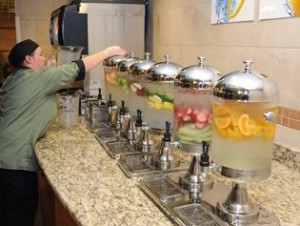Dementia Care Combined with Comprehensive Nutrition Care
What is Comprehensive Nutrition Care?
Comprehensive Nutrition Care is a creative and comprehensive way to provide care. It takes a complete approach to nutrition care with the purpose of supporting individuals with chronic or life-threatening disease, and healthcare providers who support them, to better manage their health through optimal nutrition.
Why is Nutrition Care Needed for Dementia Care?
Eating and enjoying a meal is part of our everyday life and important to everybody, not least to people living with dementia. A healthy diet and nutrition is fundamental to well being at any stage of life and to helping to combat other life-threatening diseases. We believe it plays as important a role in relation to dementia progression, and a resident’s quality of life. Under nutrition is common among older people generally, particularly common among people with dementia. Under nutrition tends to be progressive, with weight loss often preceding the onset of dementia and then increasing in pace as the disease progresses.
In what ways are the elderly susceptible?
- Age related changes in the gastrointestinal tract combined with changes in diet and immune system reactivity affect the composition of gut microbiota, leading to increased numbers of bad bacteria, decreased number of beneficial bacteria such as anaerobic lactobacilli and bifidobacteria.
- Osteoporosis is a disease which is characterized by decreasing bone density and increasing fragility of bones due to micro
 -architectural deterioration which increases the risk of fracture. Osteoporosis is exacerbated by malnutrition, low weight, poor intake of vitamin D and calcium, and in women, low levels of sex hormones.
-architectural deterioration which increases the risk of fracture. Osteoporosis is exacerbated by malnutrition, low weight, poor intake of vitamin D and calcium, and in women, low levels of sex hormones. - Older people need higher quantities of some nutrients, for example, calcium, vitamin D and vitamin B12 due to dementia and other physiological changes making absorption of nutrients more difficult. Studies show that calcium, vitamin D, folate, iron and vitamin B12 are the most important micro nutrients in which deficiencies commonly occur in older people.
- Physiological changes to the digestive system affect appetite which can affect nutrient intake. Protein energy malnutrition is common among older people with estimates that 1 in 10 people over 65 living in the community are malnourished. These numbers triple for the elderly with dementia.
How to Prevent Malnutrition in the Elderly with Dementia?
In order to prevent malnutrition in an elderly person with dementia, functional foods need to be added to their diet. Due to the age related changes that can make it more difficult for older people to obtain the nutrients they need from their diet, functional foods can have a role to play in improving nutrient intake.
What is a Functional Food?
Functional food is a conventional food product modified in some way to give a health benefit above and beyond basic nutrition. Functional foods can also be designed to fight a certain health condition. Functional foods are generally considered to be those food products which provide a specific health benefit over and above their basic/traditional nutritional value. Examples of functional foods are breakfast cereals with folic acid, yogurt with additional probiotic, vitamin D and calcium fortified orange juice are just a few examples.
The Takeaway..
An elderly person with dementia that has lost weight and is exhibiting symptoms of malnutrition, needs abundant additional assistance to get out of the malnutrition danger zone. Because of the chemical and physical changes, nutrition therapy may be the only option to help them stay healthy and thrive. Nutrition Therapy is a daily ongoing person centered care program that can change lives.





